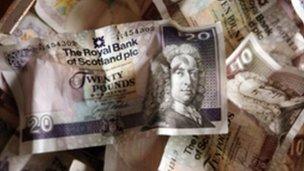Scots recovery 'faster than UK'
- Published

Dr Gillespie believes Scotland's economic recovery rate could be faster than the rest of the UK
Scotland's economy could return to pre-recession levels during 2014, despite "fragile" prospects for this year, according to the chief economist at the Scottish government.
That would mean a faster rate of recovery than the UK as a whole, and could have an impact on the independence referendum scheduled for autumn 2014.
Dr Gary Gillespie said the eurozone crisis remains the biggest risk facing the Scottish economy.
But if European leaders continue to "muddle through" without the crisis worsening, he said Scotland has some advantages in its recovery rate.
Dr Gillespie said Scotland's relatively lower housing costs mean Scots will take a shorter time than in other parts of the UK - particularly in London - to recover.
The economic adviser also cited higher saving rates in Scotland over the past decade, suggesting Scots are better placed to reduce personal debt levels.
Recovery for the whole UK has been set back by a surprise deepening of the second dip of the recession.
Bank crisis
On Wednesday, the Office of National Statistics published its first estimate of Gross Domestic Product in the UK for the second quarter of this year showing the economy contracted by 0.7%. That followed a dip of 0.7% over the previous two quarters.
That means the UK economy is 4.5% below the previous level of output reached in 2008, while the Scottish economy in March was 3.9% lower, with signs that the contraction beginning last autumn is much shallower.
Dr Gillespie said there has been consideration of what could happen to the Scottish economy if the eurozone collapses and the bank crisis deepens, but no forecasts on that basis.
He added that Scotland has a higher proportion of its exports going to the European Union, at 45%, than the UK as a whole.
The chief economist's assessment of the Scottish economy were that growth will remain "fragile" this year, increasing through 2013 to return to pre-recession levels "some time in 2014".
He said that recovery depends on a pick up in confidence, to boost private sector investment and strengthening exports.
He said the weak performance of construction has dragged the economy backwards, while production and services, representing 90% of Scotland's economy, are "far healthier than the headline GDP figures suggest, with further scope for expansion".
'Remain challenging'
John Swinney, the Scottish finance secretary who was attending the global business summit in London on Thursday, said the report suggested Scotland's economy was showing more resilience than the UK.
"Conditions in the construction sector are likely to continue to remain challenging without a pick-up in demand, which reinforces my view of the need for the UK government to take immediate action to stop the sector's slowdown through capital investment.
"Last month we announced our plans for a £105m package of economic stimulus, which will maximise opportunities to create jobs and growth. We need the Chancellor to take action, to follow Scotland's lead, and borrow an extra £5bn to invest in capital projects which would guarantee Scotland's £400m plus share would be allocated in this financial year."
Labour's economy spokesman at Holyrood, Ken Macintosh, said: "This report shows how little impact the SNP's much publicised economic interventions have had.
"Whilst much of the blame can rightly lie at the door of 11 Downing Street, that's no excuse for the SNP's failure to address the real issues in Scotland's economy."